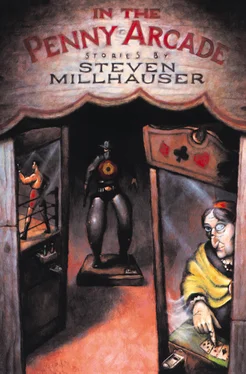“Well, I believe in Nature. I believe Americans ought to get back to Nature, like the Indians. God, can’t a poor working girl enjoy Nature without everybody having a conniption fit? Slaving in the factory nine to five, six days a week, ten children, my husband drunk every night—”
“Hell, honey, you think you got problems. My husband don’t drink, but I got ten drunk children. Listen, a bunch of us are going inside now, O.K.? I’ve had enough of Mother Nature for one night. Time to catch a little of the Sonia Holmes show. They’ve got Potato Frills, Cath. Suit yourself. I tried.”
Catherine watched them tramp down to the driveway and into the garage. The inner door opened, and she heard shouts and laughter and music: piano chords, not records. Only Roger and Bill Newmeyer stayed outside, sledding hard, over and over again, with a concentration and seriousness that seemed to her beautiful. Someone smoking a cigarette came up from the house — it was George Silko — and joined them for a time, but the spirit of pure, silent concentration had been broken, and soon all three went down to the house. Catherine was alone, in her tree.
She could never go down there, because Peter Schiller was there. He had pinned her to the sled and put those words inside her, and then he had gone back to the house and left her there with the words inside. It was as if — she tried to think how it was — he had suddenly touched her breast. She felt he had delicately wounded her in some way.
A light went on over the garage: the party had spread to the kitchen. Through a sliver of window between translucent curtains she saw someone pass clearly between blur and blur. Down in the playroom someone must have opened a window, for Catherine could hear the out-of-tune piano coming from the front of the house. A voice cried “I can’t find it.” There was a burst of laughter. The window shut.
For a moment she had been drawn into the warm room and the laughter, and now she was banished to her cold tree. She remembered standing at the top of the slope, feeling the moonlight pour into her face. It seemed a long time ago. Catherine felt that something strange was happening, that at any moment the house below might start slowly sliding away over the snow, like a great, silent ship with yellow windows.
She heard the piano again: someone was coming to get her. From the garage Len Anderson, wearing a sweater but no coat, stepped onto the driveway. He had his hands in his pockets, and he hunched his shoulders quickly against the cold. He looked up at the willow, and then at the pine, and walked rapidly across the driveway, stopping at the side of the hill. “Catherine?” he called. She wondered if he could see her through the dark branches. “Here,” she answered, feeling absurd. Len raised an arm and waved. “O.K.!” he said, and turned around and went back into the house.
She supposed they were all talking about her. Where was Catherine? Sitting in a stupid tree. Everything was strange, all the houses were about to float away, the moon was looking sorrowfully for Catherine, but no one was there.
She hugged herself in the cold, shivered dramatically, as if someone were watching, and tried to understand what had happened. She had been in one of her moods, wide open to the blue mystery of night and the festive, solemn snow. There were times when the world seemed to Catherine a whole series of little explosions, going off one after the other, and all she could do was stand transfixed, feeling it happening all around her. And so they had ridden down on the sled, and she had lain on her back in the snow, looking up at Peter Schiller’s bewildered face. And perhaps, without intending to, she had encouraged him to say those words. She had caught him in her wonder. She had bewitched him. She had offered herself to the night and the snow, and poor old Peter had misunderstood. It wasn’t his fault. And the longer she stayed in her tree, the more awkward everything was becoming. It seemed to her that she must go down to the house quickly, quickly, and set things right. She would behave as if nothing had happened. And then, in a moment when they were alone, she would explain that she had been touched by what he had said — really touched, Peter — but that she preferred to think of him as a dear friend. She hoped he would think of her that way too. She was not in love with anyone at all.
Catherine was so relieved that she clapped her gloved hands, sending up a faint snowspray. She felt that if she could see him quickly, and explain, then the words would go away, as if they had never been spoken. Everything would be all right between them. Nothing would have happened at all.
Catherine tried to hurry through the high snow. She had to take big, awkward steps, and snow got into her boots. She thought of the rabbit or cat she had seen at the back of the house. She wondered if it had found a warm, dry place, out of the snow. On the driveway she looked down at the little mounds of snow on her boot-toes and stamped each foot hard. As she entered the garage and passed along the side of a darkly gleaming car, a nervousness came over her, but she hurried on.
The inner door opened onto a tiny hall. Wooden steps covered with black rubber led up to the kitchen. Directly on her left was the dark red door of the playroom. On her right was a dusky workroom where, on a long workbench under a dim yellow bulb, dripping coats lay carelessly heaped.
“The mystery woman returns,” said Brad from the couch. He gave a little wave. The room was hot and dimly lit and full of smoke. She did not see Peter. She felt her cheeks tightening and tingling in the warmth, as if her face were being pulled carefully into place over her skull. Ned Toomey, seated at the piano with a cigarette in the corner of his mouth and his eyes narrowed in the upstreaming smoke, was playing “Sloop John B.” Beside him, looking intensely at the music and holding in one outstretched hand an empty glass, stood Richie Jelenik, singing in a deep, mournful voice. On the other side Ken Jackson stood with one foot on the piano bench, playing the guitar and leaning close to the music as he looked back and forth quickly from the notes to his left hand. The two couches were full, people walked about, on the floor in a lamplit corner Roger and Bill Newmeyer were building a high tower with small colored blocks. “They said you were in a tree,” said Nancy Russell, and Catherine noticed that Nancy Russell’s eyebrows were not the same length. A bowl of Potato Frills appeared. A hand held out a paper cup of ginger ale. Catherine, glancing at a window, saw with surprise her surprised face. Through herself she saw brilliant yellowish snow and a yellow-lit lantern on a black pole. Ned Toomey and Ken Jackson came to the end of “Sloop John B,” and Richie Jelenik put his glass down on the piano. They began to play “Goodnight Irene.” Catherine moved across the room toward Brad. “I’m back,” she said, and sat down next to him as he shoved over. “Isn’t it awfully smoky in here?”
“It goes with the décor. We can have a tree brought in for you, if you’d like that. We could set it up by the piano.”
“I had a wonderful time in my tree, thanks. All it needed was a heater. Where’s Bev?”
“Upstairs, enjoying the absence of smoke, music, and teenage fun.”
“I guess Peter fled up there too.”
“I don’t know. He was here when we came in, moping in that corner. I thought he went out again. What did you say to him, cruel woman? Oh, they’re good at this one.”
Ned Toomey had broken off “Goodnight Irene” and had passed without pause into a series of climbing, suspenseful phrases with his right hand. There were shouts of applause. The phrases climaxed in harsh rock-and-roll chords, and Richie Jelenik sang deeply, soulfully, soaringly:
Читать дальше












